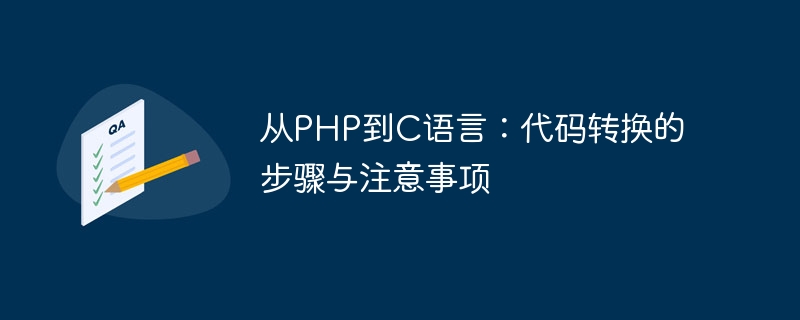Home >Backend Development >PHP Tutorial >From PHP to C language: steps and considerations for code conversion
From PHP to C language: steps and considerations for code conversion
- WBOYWBOYWBOYWBOYWBOYWBOYWBOYWBOYWBOYWBOYWBOYWBOYWBOriginal
- 2024-03-13 11:45:03636browse

From PHP to C language: steps and precautions for code conversion
In the process of software development, sometimes we will encounter the need to convert the original code written in PHP The code is converted into C language. Although there are big differences in grammatical structure and features between PHP and C languages, with some steps and techniques, we can successfully complete this conversion. This article will introduce the steps and considerations for code conversion from PHP to C language, and provide specific code examples.
Step 1: Understand the difference between PHP and C language
First of all, it is necessary to clarify the difference between PHP and C language:
- PHP is an interpreted type language, and C language is a compiled language;
- PHP has dynamic typing and garbage collection mechanism, while C language requires manual memory management and requires explicit declaration of variable types;
- PHP supports Object-oriented programming, while C language requires manual management of data structures.
Step 2: Convert the code line by line
When performing code conversion, we need to analyze the original PHP code line by line and find the corresponding C language syntax replacement. Here are some common code conversion examples:
- Declaring variables
PHP:
$name = "John"; $age = 30;
C language:
char name[] = "John"; int age = 30;
- Print output
PHP:
echo "Hello, World!";
C Language:
printf("Hello, World!
");- Single if statement
PHP:
if ($age > 18) {
echo "Adult";
}C language:
if (age > 18) {
printf("Adult
");
}Step 3: Handling special situations
When performing code conversion , you may encounter some special situations that require special handling. For example, arrays in PHP correspond to arrays or structures in C language, and attention needs to be paid to appropriate conversions.
Notes
- Memory management: When converting to C language, you need to manually manage the memory to avoid memory leaks and overflow problems. Use functions such as malloc and free to allocate and release memory.
- Security: C language is more susceptible to security vulnerabilities such as buffer overflow than PHP. When converting, you need to pay attention to the principles of safe programming to avoid vulnerabilities.
- Performance optimization: C language is usually better than PHP in terms of performance, but it is also necessary to pay attention to appropriate performance optimization of the converted code to ensure the efficient operation of the program.
Through the above steps and precautions, we can successfully convert PHP code into C language code to achieve cross-language application development. When performing code conversion, it is necessary to fully understand the characteristics and differences of the two languages to ensure a smooth conversion. I hope that the steps and examples provided in this article can help readers better complete the conversion of PHP to C language code.
The above is the detailed content of From PHP to C language: steps and considerations for code conversion. For more information, please follow other related articles on the PHP Chinese website!

